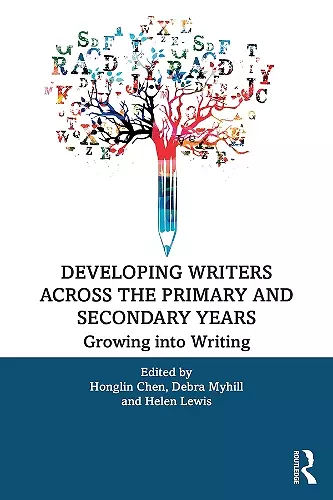Developing Writers Across the Primary and Secondary Years
Growing into Writing
Helen Lewis editor Honglin Chen editor Debra Myhill editor
Format:Paperback
Publisher:Taylor & Francis Ltd
Published:20th Mar '20
Currently unavailable, and unfortunately no date known when it will be back
This paperback is available in another edition too:
- Hardback£145.00(9780367893736)

Writing development and pedagogy is a high priority area, particularly with standardised testing showing declines in writing across time and through the years of schooling. However, to date there are relatively few texts for teachers and teacher educators which detail how best to enable the children to become confident, autonomous and agentic writers of the future.
Developing Writers Across the Primary and Secondary Years provides cumulative insights into how writing develops and how it can be taught across years of compulsory schooling. This edited collection is a timely and original contribution, addressing a significant literacy need for teachers of writing across three key stages of writing development, covering early (4-7 years old), primary (7-12 years old) and secondary years (12-16 years old) in Anglophone countries. Each section addresses two broader themes — becoming a writer with a child-oriented focus and writing pedagogy with a teacher-oriented focus.
Together, the book brings to bear rigorous research and deep professional understanding of the writing classroom. It offers a novel approach conceiving of writing development as a dynamic and multidimensional concept. Such an integrated interdisciplinary understanding enables pedagogical thinking and development to address more holistically the complex act of writing.
In a multimodal world, the significance of writing is too easily forgotten. This rich collection of Australian and British action research re-focuses our attention on the instrumental role played by writing development in all aspects of teaching/learning ¬– ranging across sectors, across informing social semiotic approaches and across individual and social perspectives as it does so. A timely reminder for ‘woke’ educators in our Web 2.0 communication age.
Professor J R Martin, Department of Linguistics, University of Sydney, Australia
An increasing body of research into children’s writing performance in recent times has demonstrated how considerable are the changes that occur from early childhood to late childhood, and thence to adolescence and adult life. Written language is quite different from speech, and while children normally commence their schooling with a degree of spoken proficiency, it takes some years of development to master the written code. This volume brings together a timely and useful set of chapters that reveal many of the challenges for children in learning to write before school and in the primary and secondary years. As such, the volume offers valuable insights for teachers at all ages.
Frances Christie, Emeritus Professor of Language & Literacy Education, University of Melbourne, Australia
In a multimodal and complex world, writing development for children and young people remains an imperative in education. Whether writing is conceived as a technical skill and/or a key conduit for personal and social development, it is a key mode for communication in the twenty-first century and has not been replaced by other modes. Rather, it is finding its place in the firmament of communication. This multi-national edited collection is the work of experts in the field who understand the relationship between research, policy and practice, and will be an authoritative guide for years to come.
Professor Richard Andrews, University of Edinburgh, UK
How can classroom instruction support children becoming writers? What pedagogical practices might teachers employ across schooling years to nurture children as writers? The capacity to write well is a critical factor of academic success and productive participation in learning and civic life. This edited volume of classroom research provides a needed resource that expertly addresses the complexity of supporting children becoming writers across time– from fostering emerging writers in the early years, to supporting social, linguistic and cognitive development of primary school writers, to addressing the complexity of writing in secondary schools. Chapters offer accessible accounts of interdisciplinary research with clear implications for pedagogical practices across the years of schooling.
Maureen Boyd, Associate Professor, Department of Learning and Instruction, Graduate School of Education, University at Buffalo, USA
This book is an important contribution to the literature of writing development. It deals with fundamental requirements for developing good writing education: It presents a nuanced understanding of the concept of writing development, it combines perspectives from both linguistics and psychology in a rich array of research, and throughout the book implications for classroom practices are discussed. The book challenges normative approaches and invites the readers to independently reflect on how to meet children’s needs as writers in the complex, multimodal and digital world of today. It will become an influential book in times when accountability and measuring achievements more and more are prevailing.
Synnøve Matre, Professor in Nordic Languages and Literature, Department of Teacher Education, The Norwegian University of Science and Technology (NTNU) Trondheim, Norway
ISBN: 9780367893750
Dimensions: unknown
Weight: 448g
266 pages